BBC Sport on rallying the Japanese Olympic spirit from the UK with its first remote Summer Games production
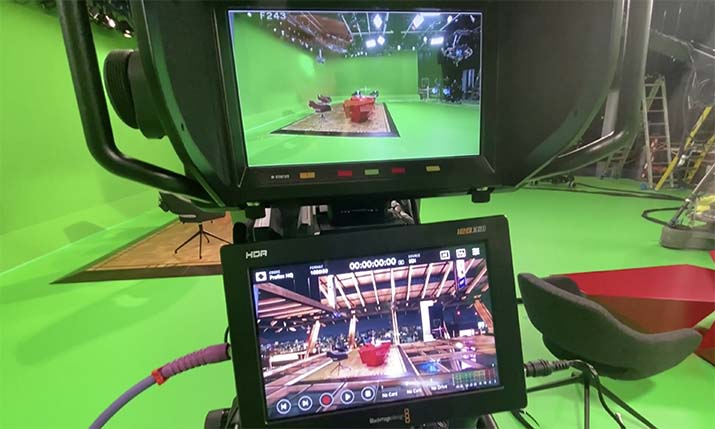
BBC Sport is producing its Olympic content remotely from its studios in Salford, UK, a first for the broadcaster on a Summer Games
BBC Sport is producing more limited Summer Olympics coverage this year with two live events shown at any one time, compared to previous years, where it gave the British public full and immersive coverage of every moment of London 2012 and Rio 2016. Those two streams are also, in another first for the broadcaster, being produced remotely from its base at dock10 in Salford, rather than mostly on location.
This year Olympic fans in the UK are seeing just two streams from the BBC, thanks to the European rights deal with Discovery from the international Olympic Committee (IOC), which kicked in for Tokyo 2020. This is causing some consternation amongst viewers as the major rights holder has put most of its content behind paywalls and subscription services.
UK viewers are somewhat confused that they are not able to watch the full gamut of Olympic coverage on the BBC this time, says Ron Chakraborty, BBC Sport’s lead executive for major events, speaking to SVG Europe. “On the sort of the reviews and the feedback of the coverage we’ve got, the main talking point has been the two streams [we are providing because of] the rights deal we have with Discovery, where having shown pretty much everything in London and in Rio in 2012 and 2016, we are now limited to be able to stream just two live sports. That’s been the criticism, which we knew was coming because the rights deal was signed six years ago.
“But that [criticism] almost feels like a positive in a way,” adds Chakraborty, referring to the viewers’ demand for more BBC coverage of this infamous event, which has been put together in spite of many obstacles. “This has been such a difficult operation to put together, in the way that we took three quarters of the operation from Tokyo back to Salford [due to the pandemic].”
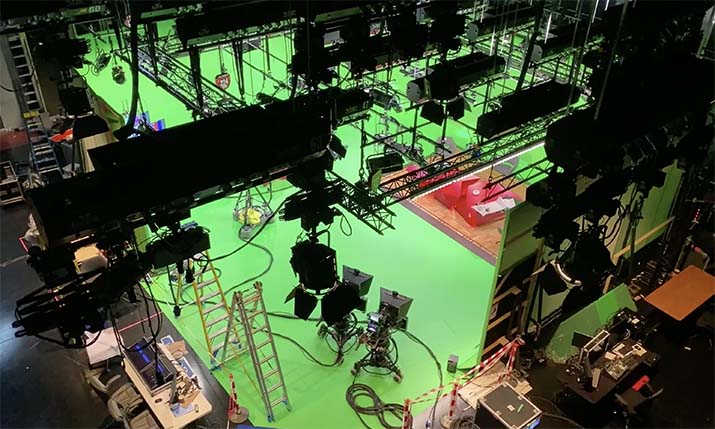
British viewers are only just cottoning onto the fact that the BBC Sport ‘Tokyo studio’ is actually virtual
Surprise! It’s not real!
Another surprise for British viewers is that many have only recently realised that BBC Sport’s Japanese style Tokyo studio is, in fact, virtual and coming to them from the slightly less exciting Salford, Manchester. The majority of BBC Sport’s commentary team are in the UK also, working from dock10’s studios in Salford in specially created cubicles.
Comments Chakraborty: “If [viewers were able to come] to dock10 and see the set up, the way we’re doing commentary, and obviously the studio itself being just a green box at Salford, they’d be surprised. So many viewers think we’re in Tokyo, I think it’s just a really great compliment for the technical teams and production management that have made this work and made the viewers think that this is a normal BBC Olympics production; the same style and quality production as we used to make, despite the fact that what we’re doing and how we’re doing it is so different.”
“It’s just been a real kind of camaraderie between all the commentators, knowing they’ve all got to do this, they’ve all got to do these crazy midnight shifts, the ludicrous alarm calls and do the very long hours, and they’ve got on with it and really delivered”
Chakraborty goes on: “That’s been a real success for us, that [virtual] studio. It was almost a relief actually when we changed plans and moved the studio and the presenters, the commentators, back from Japan to the UK back in November [when] we made the call. We already had the plan for that studio in place so it just meant we didn’t have to come up with something from scratch with a few months ago as that was already the design.
“To be honest, I think the delay for a year meant that the guys from Lightwell and Moov, who installed the studio, had time to fiddle with it and enhance it and make sure everything was as detailed as it can be. So it’s been one of the big successes of the production without doubt.”
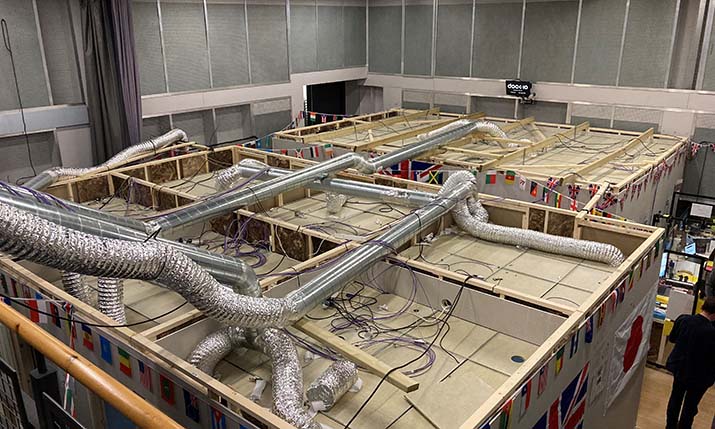
The commentator Multipurpose Audio Studio is a series of small cubicles in the basement of BBC Sport’s Salford studios
Remote atmosphere
Being so far removed geographically from the action in Japan and the subsequent time difference was at first thought to be a potential problem in terms of feeling the atmosphere of the Games, but it quickly resolved itself, Chakraborty says: “That was a fear we had going into [the Olympics]; how we get that buzz when you’re looking at the hours you’re working? I think there was a concern for our commentators as well – the swimming guys, the rowing guys – they would begin commentating on medals at 2.30 in the morning in a little off-tube in the basement and, you know, would they be able to get up for it?”
“We’ve got a lot of new people doing the Olympics for the first time, and we’re just so, so proud of them for getting through all because it’s so difficult juggling 33 sports and trying to work out what to show at the right time and add a bit of context to it.”
“The results have been amazing,” says Chakraborty. “If you listened to our swimming commentary, you’d think they were there in the arena. We’ve got an amazing little set up in the basement [here in Salford]. It’s called the Multipurpose Audio Studio where there’s 10 off-tubes, so literally you walk in there and you can hear all sorts of guys shouting everywhere. Obviously, they can’t hear each other, but they’ve created a really nice atmosphere down there; there’s flags everywhere, there’s commentary quotes written on the wall, that sort of thing.
“It’s just been a real kind of camaraderie between all the commentators, knowing they’ve all got to do this, they’ve all got to do these crazy midnight shifts, the ludicrous alarm calls and do the very long hours, and they’ve got on with it and really delivered. And again, it’s another place where you wouldn’t have noticed the difference [between our previous Olympic coverage on location and now]. So it’s been far from ideal, but what they’ve done is been really, really impressive.”
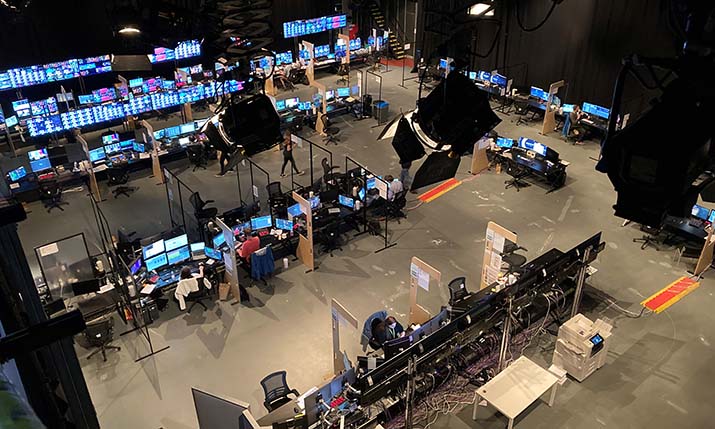
BBC Sport’s post production area at dock10 is in the repurposed HQ2 studio
Keeping people together
BBC Sport has reduced its crew for this Olympics overall, with around four fifths of the number it took out to Rio in 2016, which totalled about 400 people. In Salford it is running five gallery shifts, with the overnight team covering specific sports from the time they begin till around 5am or 6am, another team on the breakfast show, daytime teams that work from around 9am to 3pm, catch up crew on the best of what viewers have missed that day working between 3pm and 6pm, then the highlights team working on the BBC One prime time show.
A challenging aspect to this production has been keeping the team together over the course of the Olympics, with multiple shifts operating and the main production being in the UK.
“Our storytelling has focused on the athletes, their stories, and there are some amazing ones. There are guys on the one hand on our big major sports who have the lottery funding and have delivered, then you get the BMX guys who’ve been crowdfunding and managed to raise £50,000 to get over there and they win medals! It’s absolutely brilliant”
Chakraborty explains: “It’s been hard to keep everyone together and feel like one big team. I mean, you send out big emails on how we’re doing and the audience figures, but ultimately there is a lot of people working on this that won’t see each other at all during the Games; they’re working on their various gallery shifts and so on.”
However, he adds: “They’ve all done really, really well. We’ve got a lot of new people doing the Olympics for the first time, and we’re just so, so proud of them for getting through all because it’s so difficult juggling 33 sports and trying to work out what to show at the right time and add a bit of context to it. So from that point of view I couldn’t be happier.”
From a management perspective, the time difference also makes things complicated. Chakraborty says: “Even myself and Jonny Bramley [BBC Sport executive producer, major events, who is based in Japan right now] as the two executive leads, we only have a little window where he’s awake in Tokyo and I’m awake here; we just have that little overlap in the middle of where we’re both awake.
“No matter how many hours I try and work, I still wake up in the morning with 50 emails in my inbox and god-knows how many WhatsApp messages that I need to deal with, and that’s the first thing you do. You leave your phone on in case there are any emergencies, but by and large, we’ve got the rule that if it’s something over there, Jonny will deal with it, and if it’s something over here, I’ll deal with it.”
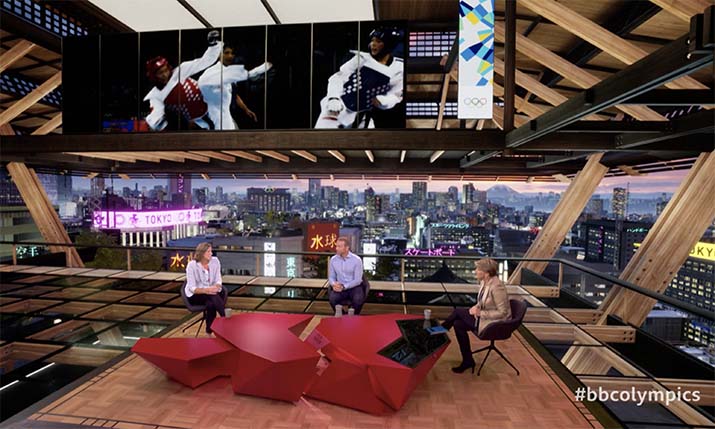
“Are you sure it’s not real?” Stunned Brits learn just how good virtual reality studios are with BBC Sport’s Olympic 2020 coverage
The difficulty for Chakraborty in managing the team in Salford has been making sure everyone gets enough sleep. He explains: “I’ve had to make a rota [for some of our commentators] because they do the swimming finals, say, in the middle of the night, but then people want the guys on breakfast [shows] as well to react to the everyday action, or there’ll be heats in the evening in Japan, so that’s the morning [in the UK], then people want them on the highlight show UK time and evening as well. So you try and calculate, “when are you going to sleep in the middle of all that?””
He adds: “Everyone’s been really patient; we’ve had multiple Olympic gold medallists saying, “I don’t mind what hours you want to do, this is the Olympics, I can sleep when it’s done”. So everyone’s being really patient from that point of view and just got on with it. I think that’s been the overall view; everything isn’t ideal, but if you look at the world today, you know, nothing’s ideal, so let’s just get through it as best we can.”
Athletic storytelling
On what BBC Sport has been trying to achieve from a storytelling perspective with tight COVID limitations in Japan for crew, and with just two feeds available to viewers, Chakraborty says it has been more about the athletes stories. “Much of what we’re doing here is trying to give you as an authentic taste of Japan as you can have. The guys out there – we sent nine reporters out there – are mostly covering the Mixed Zone and getting reactions, and that’s been a huge success for us. If you think of some of the great scenes of elation and in some cases, the tears, where people have won and lost, I think that adds such colour to our output; just the emotional side of what these athletes have been through for the last five years. So that was the main reason we sent the nine reporters out there.
“We’re slightly limited on what we can do [around Tokyo] because of the playbook restrictions. We’ve had one or two reporters that have managed to get as out and about as you can around the venues to just give you an idea of the colour, but certainly the sort of features we would have made reflecting Tokyo, generally, we just haven’t been able to make.
“What we can do, whether it’s graphics, whether it’s the studio, whether it’s the music, is just to give you a taste of Japan,” continues Chakraborty, “But we know that that element to our storytelling – the wider backdrop of the host city – we haven’t quite managed to pull that off. [So instead our storytelling has] focused on the athletes, their stories, and there are some amazing ones. There are guys on the one hand on our big major sports who have the lottery funding and have delivered, then you get the BMX guys who’ve been crowdfunding and managed to raise £50,000 to get over there and they win medals! It’s absolutely brilliant. So I think there’s been enough [stories] within the athletes – and not just the GB ones, some amazing international stories too – that have made up for the fact that we’ve been a little bit restricted in what we can do out and about.”
Chakraborty says that in despite the pandemic and all the restrictions it has placed on proceedings, the crew are – touch wood – healthy. “One lucky break we’ve had, and this is an absolutely touch wood point with four days to go, is that we’ve always been worried about COVID and people getting pinged and people getting tested positive in this country, as much as Japan. We’ve had a few people that have had to isolate in Japan, which was unfortunate, but in this country it’s been okay. And that’s really good news because I’m looking at the other events we’ve had over the summer – the Euros, the cricket, Wimbledon, the Open golf – and we’ve all had people who have had to step away from the teams for that reason.
“When people arrived in Salford, we absolutely made it so clear to be as safe as they can just because it’s such a lean, mean operation here, we couldn’t afford to have too many key absentees. And we’re now three-quarters of the way through the Games, and it hasn’t been a factor.”
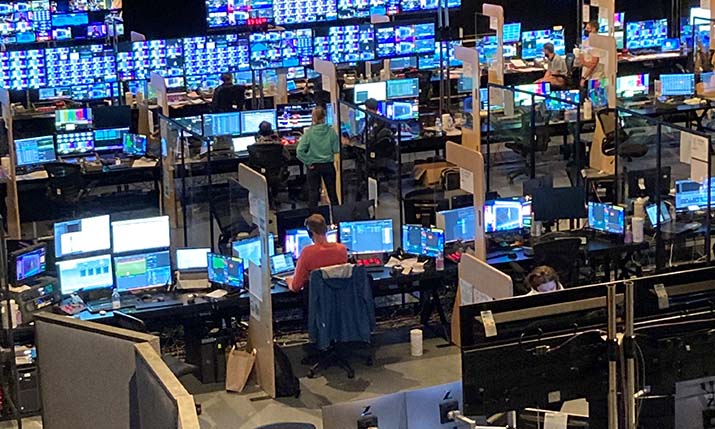
BBC Sport’s staff are working in five key shifts throughout the Tokyo Games
Next stop, China
As for what is coming next – the Beijing Winter Olympics beginning on 4 February – Chakraborty says as soon as the Summer Games have wrapped, the team will be in full throttle for snow and ice-based plans, pending more guidance from the IOC.
He notes: “There was a lot of back and forth around Tokyo with the IOC playbooks, and there was three releases of those. There hasn’t been an IOC playbook for Beijing, and obviously we’re hoping one gets released fairly soon so we can work out what we can and can’t do in China; whether there’s an isolation element to it and to adjust our plans accordingly.
“Fortunately, we are used to doing the Winter Olympics remotely,” Chakraborty continues. “While it’s a change for us to do the Summer Olympics with galleries and studio back here [in the UK], that’s what we usually do with a Winter Games, so it’s really only our content gathering and commentary that we’d have a look at and decide whether we want to reduce the numbers, and so on. It’s a bit of a waiting game at the moment, but I don’t think we want to be waiting that long because it’s only a few months away and I think everybody wants to get started. Everything seems rock solid for the broadcasters with Tokyo, but everyone’s been emailing each other, “what’s your plan with Beijing?” so I think it’s something we’re keen to get nailed as soon as we can.
“Also next year we’ve got the Commonwealth Games here, the European Championships in Munich, the Women’s Euros in the UK, Wimbledon, and World Athletics, so those things that are usually two years away after Tokyo are not, so we’ve got another big summer coming up next year as well. We’re quietly keeping an eye on those as well, but for Beijing, we need to hit the ground running on that pretty soon. There’ll be a couple of days in a darkened room after Tokyo is finished, and then off we go again,” concludes Chakraborty.

